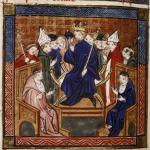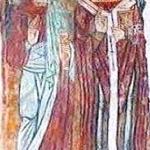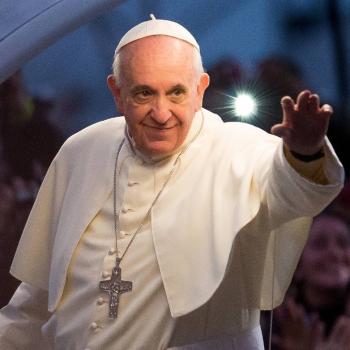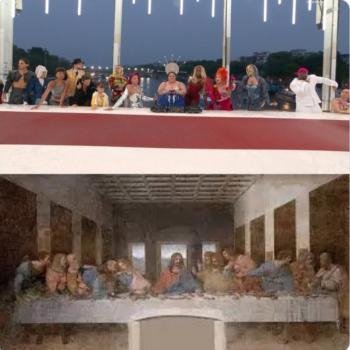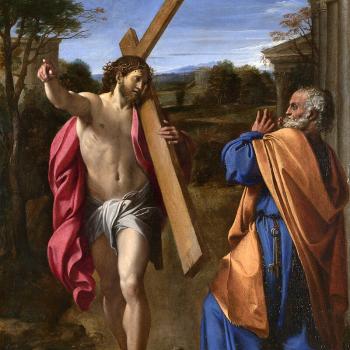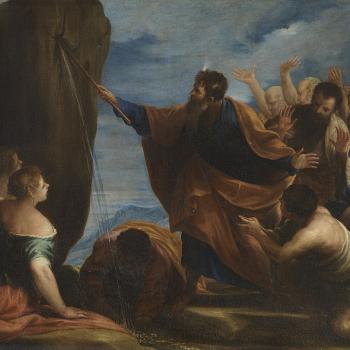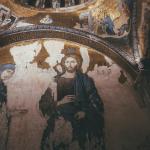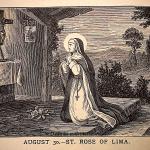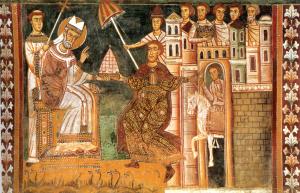
A little way back, I had set my mind to writing a series of three articles which all dealt with a few questionable claims levelled against the Catholic side in a recorded debate entitled Calvary Chapel vs Catholicism. The first was tackled in the article Catharism, Calvary Chapel, and Catholicism and its companion article. Having been preoccupied for some time, I decided to run down the remaining claims (incidental to the debate itself) in a pair of articles. The present then, will deal with the claim that the papacy was founded upon the forged Donation of Constantine. A follow-up will address the claim that the Apostle Peter never made it to Rome.
In order to facilitate things, I have transcribed the comments made by Rob Yardley, who at the time was associated with Calvary Chapel Costa Mesa. Starting at about 22 minutes, Mr. Yardley brings up the 8th-century forgery known as the Donation of Constantine. He does this in order to rebut the Catholic claim that the Bishops of Rome exist in an unbroken succession from the time of St. Peter until the present day. After bringing up the document, Yardley seems to insinuate that it was forged in an attempt “to establish the Pope’s authority” (22:42). In the preceding remarks, he betrays a belief that the papacy is an eighth-century invention (though he mistakenly attributes the document to the ninth.) Later, he pointedly asks Catholic apologist Tim Staples, “Did the Popes use [the Donation of Constantine] to establish their authority?”, to which the latter replies in the negative.
I would like to take the space that remains to make two points. The first is that it is necessary to make a distinction between what kind of authority is in question. It seems from the context that the debaters have the primacy of the Bishop of Rome in the ecclesiastical (i.e. spiritual) sphere in mind, and hence their respective positions. However, it is beneficial to differentiate between the spiritual and temporal powers. This is important because, as we will see below, the significance of the Donation of Constantine lies in the fact that it was used primarily to establish the latter. The second point then is that there is nothing bestowed on the Pope in the 8th century Donation that was not already proclaimed by earlier Popes, Church Councils, and Church Fathers.[1] But before making these arguments, a few words on the document itself will be helpful.
A Medieval Forgery
That the Donation of Constantine is a forgery is agreed upon by everyone one today, and that has been the case since the humanist Lorenzo Valla proved it to be so in the 15th century. Along with the first part which contains the legendary healing of the Emperor Constantine by Pope St. Sylvester, it forms the work known to scholars as the Constantutum Constantini.[2] Modern scholarship dates the document to the second half of the 8th c., a time concurrent with the rise of the Carolingian dynasty in A.D. 751. Most believe it to have come from Rome (either from within or from without of the papal curia). Others believe that it emanated from France. The place of composition would seem to bear on the motivations of the forger.[3] This brings us to our first point.
The Two Swords
Since at least the time of Pope St. Gelasius (d. A.D. 496) and his theory of the two swords, the Popes have made a distinction between the temporal and spiritual powers. Thus, when we discuss Yardley’s claim that the Popes utilized the Donation of Constantine “to establish their authority”, it is important to ask what kind of authority is in question? The debaters appear focused on the spiritual power, and Catholic apologist Tim Staples rejects Yardley’s claim from that vantage point. But if we keep in mind the temporal power and the historical context of the Donation, it is possible to affirm that it was indeed utilized to bolster the Pope’s temporal authority. Hence, it is noteworthy that the pertinence of the forgery to studies of the Medieval Papacy lies not in the Pope’s claim to ecclesiastical primacy, but rather to the relationship between State and Church which came to a head during the Investiture Controversy (11th c. – 12th c. A.D.)[4]
Nothing New
With respect to the ecclesiastical primacy claimed by the Bishops of Rome, Yardley seems to imply that this was something created ex nihilo in the 8th century.[5] For argument’s sake, let us run with that misconception. One who is going to posit the papacy as an outright invention might opt for an earlier origin, given that the Popes from the time of St. Damasus onward are on the record affirming that, “…the Holy Roman Church has been placed at the forefront not by the conciliar decisions of other Churches, but has received the primacy by the evangelic voice of our Lord and Savior, who says: ‘You are Peter, and upon this rock I will build My Church….”[6] Then, of course, there is the problem that St. Damasus cites the Gospel itself (1st c. A.D.). Moreover, there are bits and pieces of an Ante-Nicene Roman primacy to be found, as Tim Staples pointed out to Rob Yardley.
As Pope St. Nicholas I (d. A.D. 867) stated emphatically to the Byzantine Emperor Michael III, “These privileges [of the Roman Church] have been established by the mouth of Jesus Christ itself. It is not councils that have granted them. They have only honoured and preserved them….”[7] In a similar vein, when in the Donation of Constantine the Emperor decrees that the Pope “shall have the supremacy as well over the four chief seats [of] Antioch, Alexandria, Constantinople and Jerusalem, as also over all the churches of God in the whole world”, he concedes nothing new to the Pope except that which he already received directly from the Lord Jesus Christ.
[1] With respect to the latter two, this was a point that Mr. Staples brought up.
[2] Rojas Donat, and de Toro, José Miguel, “La ‘Donación de Constantino’: un debate historiográfico multisecular,” Revista de historia 30 no. 1 (2023): p. 2
[3] Donat and de Toro, “Donación”, pp. 3-17, esp. pp. 3-4, 9.
[4] Encyclopaedia Britannica. “Donation of Constantine.” In Britannica Concise Encyclopedia. Britannica Digital Learning, 2017; G., A. “Donation of Constantine.” In The Classical Tradition, edited by Anthony Grafton, Glenn W. Most, and Salvatore Settis. Harvard University Press, 2010; Kapsalis, Athanasios. “The False-Donation of Constantine.” Saint Emperor Constantine and Christianity – The Centre of Church Studies, 2013, p. 95; Montero, J.A. Cabrera, and Angelo Di Berardino. “DONATION of CONSTANTINE.” In Encyclopedia of Ancient Christianity. InterVarsity Press, 2014. Cf. Arnold-Baker, Charles. “False Decretals (or Pseudo-Isidore).” In The Companion to British History, Routledge. Routledge, 2001.
[5] He does not actually make the temporal/ spiritual distinction, as I indicated earlier.
[6] Williams A. Jurgens, The Faith of the Early Fathers Volume 1, (Collegeville: The Liturgical Press, 1970), pg. 404. Jurgens acknowledges that “opinion is still divided” on whether or not this citation belongs to the Decree of Damasus or the later Gelasian Decree, though he opts for the former. Cf. Robert Eno, The Rise of the Papacy, p. 30.
[7] In S. Herbert Scott, The Eastern Churches and the Papacy, (London: Sheed & Ward, 1928), p. 327.



